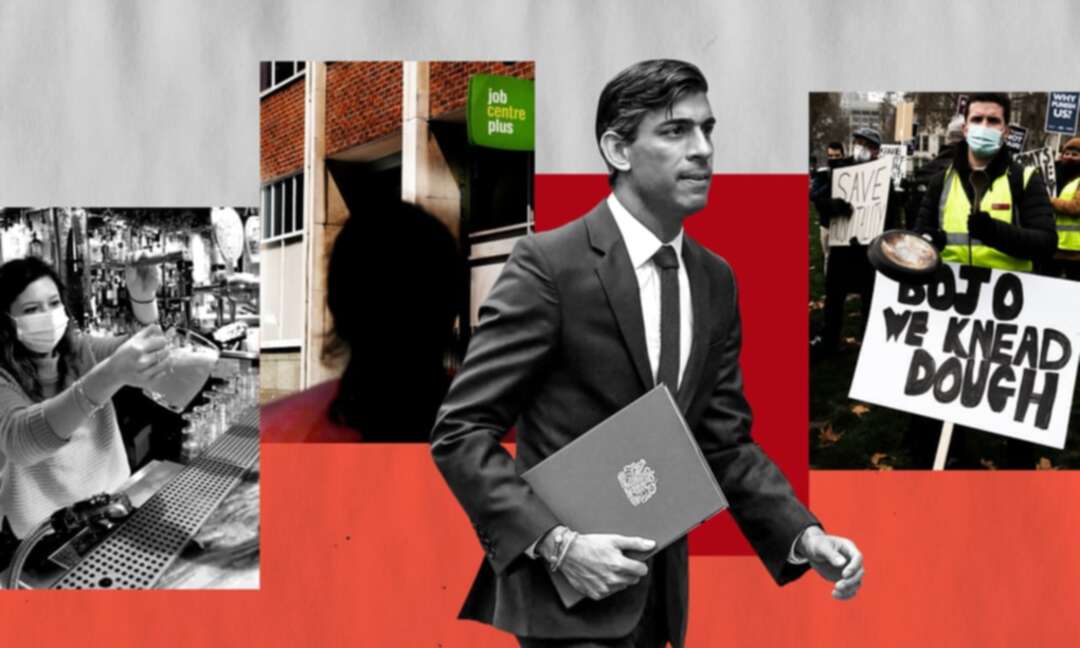-
Extend furlough or risk mass unemployment, industry and unions warn Sunak

Exclusive: TUC and top business groups fear economy is too fragile to end scheme in April as planned
Rishi Sunak has been warned by the leaders of Britain’s most influential business groups and the trade union movement that he risks plunging Britain into a period of mass unemployment unless he extends the furlough scheme.
Before the budget on 3 March, both sides of industry told the chancellor that the economy was too fragile to end the wage subsidy scheme at the end of April and that he risked undoing the efforts to protect jobs over the past year if he did so.
Frances O’Grady, the TUC general secretary, said Sunak should not wait until the budget but should announce immediately that furlough – which has cost the Treasury almost £50bn so far – would remain in place until the end of the year. The government, she said, had a moral obligation to prevent a return to 1980s levels of unemployment.
“It would be a dereliction of duty of any government
Adam Marshall, the director general of the British Chambers of Commerce, called for a furlough extension from April to July and said the chancellor should not be fooled into thinking that the planned phased relaxation of lockdown restrictions meant the problems of business were at an end.
“What one can’t do is say that once the vaccine rollout has happened, everything will be OK. That is not the case. You’ve got businesses in deep trouble, and still the possibility of flare ups in the virus. It’s not a case of just vaccinate and forget about it.”
Sounding the alarm as the government plots a road map for relaxing Covid restrictions this spring, the TUC and the BCC told the Guardian that a long-term plan was needed to repair the damage to the economy of a triple lockdown and the biggest annual contraction in the economy for 300 years.
Extending furlough is also a central pre-budget demand of the CBI. The lobby group’s chief economist, Rain Newton-Smith, said an announcement was needed “sooner rather than later”.
“If the government brought it to a sudden stop, that would almost certainly impact job decisions, just as we see hope on the horizon,” she said.
The warnings come as the Guardian launches a series of in-depth articles to look at the impact of the pandemic on employment in Britain, with millions of workers on furlough while coronavirus infections remain high, and as redundancies rise at the fastest rate on record.
Representing millions of workers and thousands of businesses between them, the development comes as Boris Johnson’s government draws up plans for relaxing Covid restrictions this spring. Sunak has remained open to the possibility of fresh support measures to reflect lengthier restrictions than first envisaged, but O’Grady warned that an ideological tussle appeared to be gripping the cabinet over how to support Britain’s economic recovery from the crisis.
“To cut back now would be a complete waste of all that effort, and it would be just obscene to confine a whole generation – particularly young people – to unemployment,” she said.
As the government’s flagship job support scheme, furlough has topped up the wages of almost 10 million jobs since its launch in March last year and is due to close at the end of April after several extensions. However, the Treasury’s own independent economics forecaster, the Office for Budget Responsibility, has said unemployment could spiral upwards once it expires to hit 2.7 million by the summer – more than double pre-pandemic levels.
The government’s concern about the possibility of a spring surge in job losses was underlined by an announcement from the Department for Work and Pensions of a fresh financial support scheme to help 160,000 unemployed people find work.
Announcing the measures on Wednesday, Therese Coffey, the employment secretary, said the plan to launch “digital job surgeries” would help jobseekers to improve their interview skills and offer advice to help people back into work quickly.
“Our plan for jobs is helping us build back better and fairer, getting job support to people who need it right across Britain and levelling-up opportunity,” she said.
The prime minister has said rapid deployment of the Covid vaccine will stand as the government’s most powerful economic recovery tool by enabling lockdown controls to be relaxed. Sunak batted away demands for further economic support last month by saying the Treasury had spent more than £280bn so far, while suggesting that the British economy had underlying strengths that could be unleashed as the vaccine is deployed and restrictions eased.
While the Treasury plans to refresh its Covid response in the budget, the chancellor has also suggested that many households saving money during the pandemic could help to kickstart the economy as the shackles on business and social life are removed.
Marshall said businesses needed continued help from furlough to avoid lasting scarring from the crisis, as well as longer extensions to grant schemes, VAT cuts, business rates relief and funding for training staff.
“Think of how much has been spent already. Stopping now would be akin to letting a marathon runner fall over within sight of the finish line, then not helping them over the line and giving them the support they need to recover,” he said.
source: Richard Partington
Levant
You May Also Like
Popular Posts
Caricature
BENEFIT AGM approves 10%...
- March 27, 2025
BENEFIT, the Kingdom’s innovator and leading company in Fintech and electronic financial transactions service, held its Annual General Meeting (AGM) at the company’s headquarters in the Seef District.
During the meeting, shareholders approved all items listed on the agenda, including the ratification of the minutes of the previous AGM held on 26 March 2024. The session reviewed and approved the Board’s Annual Report on the company’s activities and financial performance for the fiscal year ended 31 December 2024, and the shareholders expressed their satisfaction with the company’s operational and financial results during the reporting period.
The meeting also reviewed the Independent External Auditor’s Report on the company’s consolidated financial statements for the year ended 31 December 2024. Subsequently, the shareholders approved the audited financial statements for the fiscal year. Based on the Board’s recommendation, the shareholders approved the distribution of a cash dividend equivalent to 10% of the paid-up share capital.
Furthermore, the shareholders endorsed the allocation of a total amount of BD 172,500 as remuneration to the members of the Board for the year ended 31 December 2024, subject to prior clearance by related authorities.
The extension of the current composition of the Board was approved, which includes ten members and one CBB observer, for a further six-month term, expiring in September 2025, pending no objection from the CBB.
The meeting reviewed and approved the Corporate Governance Report for 2024, which affirmed the company’s full compliance with the corporate governance directives issued by the CBB and other applicable regulatory frameworks. The AGM absolved the Board Members of liability for any of their actions during the year ending on 31st December 2024, in accordance with the Commercial Companies Law.
In alignment with regulatory requirements, the session approved the reappointment of Ernst & Young (EY) as the company’s External Auditors for the fiscal year 2025, covering both the parent company and its subsidiaries—Sinnad and Bahrain FinTech Bay. The Board was authorised to determine the external auditors’ professional fees, subject to approval from the CBB, and the meeting concluded with a discussion of any additional issues as per Article (207) of the Commercial Companies Law.
Speaking on the company’s performance, Mr. Mohamed Al Bastaki, Chairman BENEFIT , stated: “In terms of the financial results for 2024, I am pleased to say that the year gone by has also been proved to be a success in delivering tangible results. Growth rate for 2024 was 19 per cent. Revenue for the year was BD 17 M (US$ 45.3 Million) and net profit was 2 Million ($ 5.3 Million).
Mr. Al Bastaki also announced that the Board had formally adopted a new three-year strategic roadmap to commence in 2025. The strategy encompasses a phased international expansion, optimisation of internal operations, enhanced revenue diversification, long-term sustainability initiatives, and the advancement of innovation and digital transformation initiatives across all service lines.
“I extend my sincere appreciation to the CBB for its continued support of BENEFIT and its pivotal role in fostering a stable and progressive regulatory environment for the Kingdom’s banking and financial sector—an environment that has significantly reinforced Bahrain’s standing as a leading financial hub in the region,” said Mr. Al Bastaki. “I would also like to thank our partner banks and valued customers for their trust, and our shareholders for their ongoing encouragement. The achievements of 2024 set a strong precedent, and I am confident they will serve as a foundation for yet another successful and impactful year ahead.”
Chief Executive of BENEFIT; Mr. Abdulwahed AlJanahi commented, “The year 2024 represented another pivotal chapter in BENEFIT ’s evolution. We achieved substantial progress in advancing our digital strategy across multiple sectors, while reinforcing our long-term commitment to the development of Bahrain’s financial services and payments landscape. Throughout the year, we remained firmly aligned with our objective of delivering measurable value to our shareholders, strategic partners, and customers. At the same time, we continued to play an active role in enabling Bahrain’s digital economy by introducing innovative solutions and service enhancements that directly address market needs and future opportunities.”
Mr. AlJanahi affirmed that BENEFIT has successfully developed a robust and well-integrated payment network that connects individuals and businesses across Bahrain, accelerating the adoption of emerging technologies in the banking and financial services sector and reinforcing Bahrain’s position as a growing fintech hub, and added, “Our achievements of the past year reflect a long-term vision to establish a resilient electronic payment infrastructure that supports the Kingdom’s digital economy. Key developments in 2024 included the implementation of central authentication for open banking via BENEFIT Pay”
Mr. AlJanahi concluded by thanking the Board for its strategic direction, the company’s staff for their continued dedication, and the Central Bank of Bahrain, member banks, and shareholders for their valuable partnership and confidence in the company’s long-term vision.
opinion
Report
ads
Newsletter
Subscribe to our mailing list to get the new updates!





















